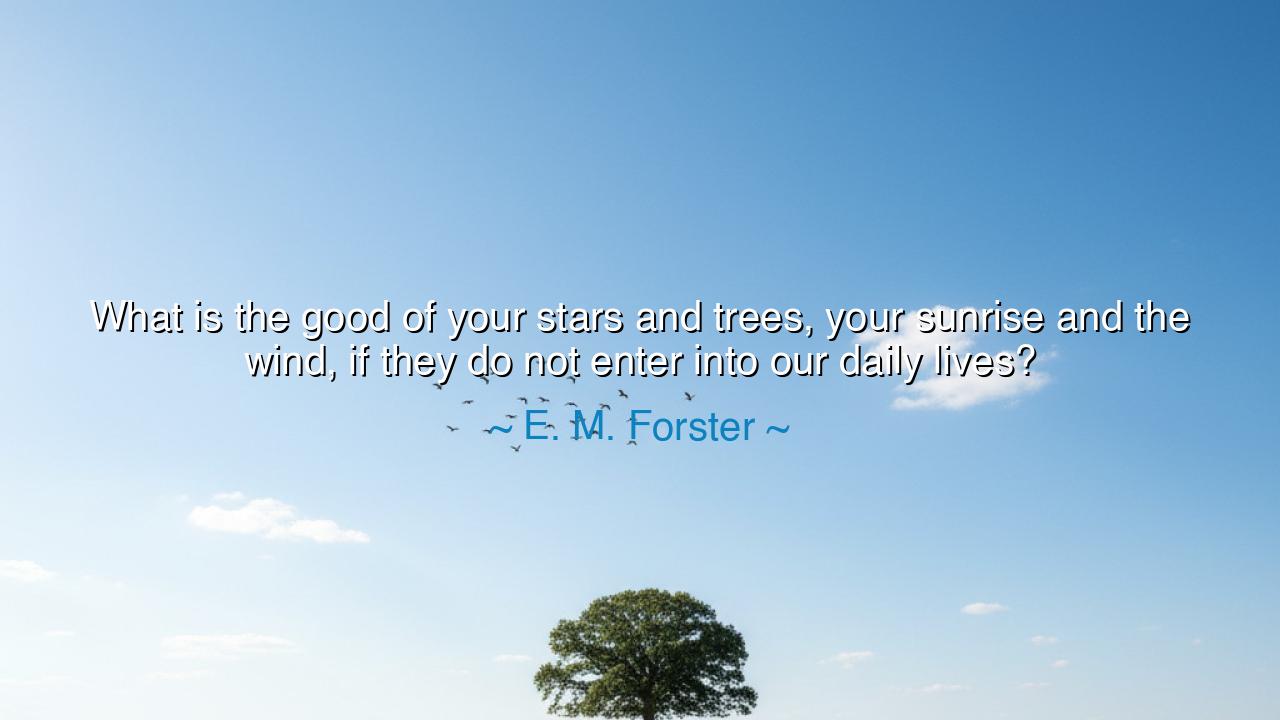
What is the good of your stars and trees, your sunrise and the
What is the good of your stars and trees, your sunrise and the wind, if they do not enter into our daily lives?






"What is the good of your stars and trees, your sunrise and the wind, if they do not enter into our daily lives?" Thus asked E. M. Forster, the English novelist, whose pen pierced not only the fabric of society but also the heart of existence. His words challenge us to consider the vastness of nature not as a distant spectacle, admired only in passing, but as something meant to live within us, to shape our thoughts, our actions, and our way of being. What value have the heavens, if their majesty never touches the human soul? What worth have the forests, if their stillness does not bring peace into our lives? Forster’s question is both tender and thunderous: nature’s beauty must not remain outside of us—it must become part of us.
The ancients understood this truth. They did not look upon the stars as mere lights in the night, but as guides for their journeys, symbols of fate, and reminders of eternity. They did not see the trees only as wood for the fire, but as sacred beings, rooted in the earth and reaching toward heaven. The sunrise was not only a spectacle of light, but a daily promise that life renews itself, that each day offers a chance to begin again. And the wind, invisible yet powerful, was revered as spirit, breath, and freedom. Forster’s words echo this ancient wisdom: what good is nature’s glory if it does not mold the heart and guide the soul?
Consider the story of Henry David Thoreau, who withdrew to Walden Pond to live simply, close to the rhythms of the earth. For two years he built his life around the trees, the sunrise, the rippling waters, and the whispers of the wind. He discovered that the power of nature was not in rare journeys to mountains or seas, but in the daily act of walking, observing, and letting nature’s presence enter the fabric of his life. From that simple living came words that continue to inspire generations, teaching us that the eternal is always woven into the ordinary.
Forster also warns us of a danger: that in the modern age, men may admire nature as spectators, but not as participants. We photograph the sunrise, but do not rise early enough to greet it. We walk past the trees in cities and parks without noticing their shade or hearing their silence. We gaze at the stars when reminded, but seldom allow their immensity to humble us. And the wind, though it brushes against our faces, rarely awakens in us the reminder of freedom and the fragility of breath. If we allow nature to remain separate from our daily lives, we live as though exiled from the very source of our being.
Yet the words of Forster are not only warning but invitation. He calls us to bring nature into our daily lives—to see each morning’s light as a gift, each breeze as a companion, each tree as a silent teacher, each star as a reminder of our smallness and our greatness. When nature enters into us, we become more grounded, more patient, more reverent. We learn balance from the trees, resilience from the wind, renewal from the sunrise, and humility from the stars. These are not luxuries, but necessities for the human soul.
The lesson is this: do not confine nature to poetry, art, or occasional retreats. Let it live within you every day. Look upon the sky when you rise, pause beneath a tree in the midst of your labor, listen to the wind when you are weary, and watch the stars when you are lost. Let these things become part of your rhythm, not as decoration but as guidance. For in this union, life gains depth, and the soul gains peace.
Practically, this means reclaiming moments of stillness. Set aside time to walk outdoors each day, not with haste, but with attention. Bring the presence of nature into your work and your rest. When you plan, think as the stars do—in long courses. When you endure, stand as the trees do—rooted and steady. When you need renewal, rise as the sun does—faithful each morning. When you feel trapped, move as the wind does—free and unseen, yet powerful.
So let Forster’s question be answered by your life: “The stars, the trees, the sunrise, and the wind are good, because they live in me.” Teach this to your children, remind it to your friends, and whisper it to your own soul each day. For when nature enters into our daily lives, beauty is no longer something admired from afar—it becomes the very breath we live by, the eternal presence that strengthens and sustains us.






AAdministratorAdministrator
Welcome, honored guests. Please leave a comment, we will respond soon